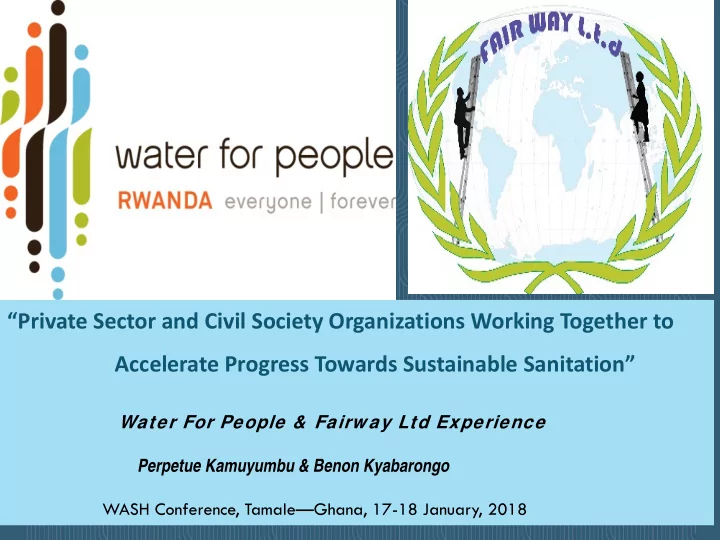

“Private Sector and Civil Society Organizations Working Together to Accelerate Progress Towards Sustainable Sanitation” Water For People & Fairw ay Ltd Experience Perpetue Kamuyumbu & Benon Kyabarongo WASH Conference, Tamale—Ghana, 17-18 January, 2018
A brief about Rwanda Population: o 12,274,221 Water coverage: o 75% Access to basic o Sanitation: 62% Open defecation:3% o Sector target : 100% o access to Sanitation services by 2030
RWANDA: FUNDING NEEDS TO ACHIEVE SDGs 3
Our approach to sustainable sanitation: “Sanitation Marketing”
No magic or readily available solutions! Scale Scale Testing Market Testing Idea Testing
Latrine construction Masons’cooperatives
Toilet upgrading BIG DATA SUPPORT SERVICES Ltd
Emptying services
WHAT HAS BEEN OUR ROLE? 1.Creating an enabling environment for sanitation businesses DEFAST 10
2. Creating a sustainable supply chain of sanitation equipment E-Vac Gulper III 11
3. Building Capacity of Local Entrepreneurs/service providers 12
4. Linking households and sanitation service provides to finance institutions 13
THINKING ABOUT SCALE
SCALE IS WHEN …. Demand increases without intensive promotion; The product’s or service’s cost decreases due to market competition or mass production; Supply chain growth occurs outside NGO’s facilitation activities; NGO’s implementation efficiencies are high and leads to low unit investment costs per latrine built or pit emptied; Product or service delivery expands into new areas or all areas are covered; The central regulating authority actively controls any public health risks related to the service. 15
SCALE TESTING 1. Water For People provides third tier support: two organizations between WFP and the householder; 2. WFP is not part of the supply chain; 3. Improving implementation efficiency: Increasing workload and decreasing unit costs; 4. WFP facilitates an industry, not individual businesses; 16
SCALE TESTING (CONT’D) 5. The facilitating process encourages new businesses to start up and crowd-in to an already market tested sanitation solution; 6. Scaling encourages, supports and works with government to regulate the ‘crowding-in’ process; 7. WFP lets go of control with a view to finally exiting the sector 17
KEY CHALLENGES o Sanitation business is still a new venture for the regulator, service providers, finance institutions and customers; o Demand creation takes time; o Cost based price vs affordable price?!; o Sustainable supply chain for some sanitation products/ services not always easy to ascertain. 18
PROPOSED WAY FORWARD Sector harmonized approaches to sustainable sanitation; Aggressive involvement of private sector in sanitation; Community sensitization activities by all sector stakeholders; Aggressive marketing by service providers; Creation of an enabling environment for sanitation services; Exploring new sector financing mechanisms,… 19
Thank you for your kind attention! 20
Recommend
More recommend